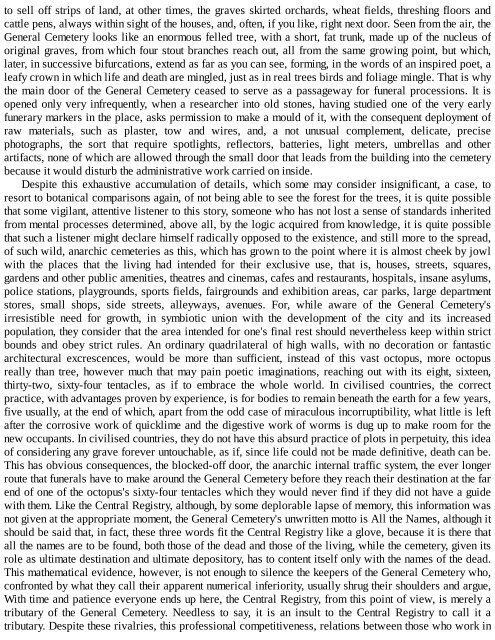You also want an ePaper? Increase the reach of your titles
YUMPU automatically turns print PDFs into web optimized ePapers that Google loves.
to sell off strips of land, at other times, the graves skirted orchards, wheat fields, threshing floors and<br />
cattle pens, always within sight of the houses, and, often, if you like, right next door. Seen from the air, the<br />
General Cemetery looks like an enormous felled tree, with a short, fat trunk, made up of the nucleus of<br />
original graves, from which four stout branches reach out, all from the same growing point, but which,<br />
later, in successive bifurcations, extend as far as you can see, forming, in the words of an inspired poet, a<br />
leafy crown in which life and death are mingled, just as in real trees birds and foliage mingle. That is why<br />
the main door of the General Cemetery ceased to serve as a passageway for funeral processions. It is<br />
opened only very infrequently, when a researcher into old stones, having studied one of the very early<br />
funerary markers in the place, asks permission to make a mould of it, with the consequent deployment of<br />
raw materials, such as plaster, tow and wires, and, a not unusual complement, delicate, precise<br />
photographs, the sort that require spotlights, reflectors, batteries, light meters, umbrellas and other<br />
artifacts, none of which are allowed through the small door that leads from the building into the cemetery<br />
because it would disturb the administrative work carried on inside.<br />
Despite this exhaustive accumulation of details, which some may consider insignificant, a case, to<br />
resort to botanical comparisons again, of not being able to see the forest for the trees, it is quite possible<br />
that some vigilant, attentive listener to this story, someone who has not lost a sense of standards inherited<br />
from mental processes determined, above all, by the logic acquired from knowledge, it is quite possible<br />
that such a listener might declare himself radically opposed to the existence, and still more to the spread,<br />
of such wild, anarchic cemeteries as this, which has grown to the point where it is almost cheek by jowl<br />
with the places that the living had intended for their exclusive use, that is, houses, streets, squares,<br />
gardens and other public amenities, theatres and cinemas, cafes and restaurants, hospitals, insane asylums,<br />
police stations, playgrounds, sports fields, fairgrounds and exhibition areas, car parks, large department<br />
stores, small shops, side streets, alleyways, avenues. For, while aware of the General Cemetery's<br />
irresistible need for growth, in symbiotic union with the development of the city and its increased<br />
population, they consider that the area intended for one's final rest should nevertheless keep within strict<br />
bounds and obey strict rules. An ordinary quadrilateral of high walls, with no decoration or fantastic<br />
architectural excrescences, would be more than sufficient, instead of this vast octopus, more octopus<br />
really than tree, however much that may pain poetic imaginations, reaching out with its eight, sixteen,<br />
thirty-two, sixty-four tentacles, as if to embrace the whole world. In civilised countries, the correct<br />
practice, with advantages proven by experience, is for bodies to remain beneath the earth for a few years,<br />
five usually, at the end of which, apart from the odd case of miraculous incorruptibility, what little is left<br />
after the corrosive work of quicklime and the digestive work of worms is dug up to make room for the<br />
new occupants. In civilised countries, they do not have this absurd practice of plots in perpetuity, this idea<br />
of considering any grave forever untouchable, as if, since life could not be made definitive, death can be.<br />
This has obvious consequences, the blocked-off door, the anarchic internal traffic system, the ever longer<br />
route that funerals have to make around the General Cemetery before they reach their destination at the far<br />
end of one of the octopus's sixty-four tentacles which they would never find if they did not have a guide<br />
with them. Like the Central Registry, although, by some deplorable lapse of memory, this information was<br />
not given at the appropriate moment, the General Cemetery's unwritten motto is <strong>All</strong> the <strong>Names</strong>, although it<br />
should be said that, in fact, these three words fit the Central Registry like a glove, because it is there that<br />
all the names are to be found, both those of the dead and those of the living, while the cemetery, given its<br />
role as ultimate destination and ultimate depository, has to content itself only with the names of the dead.<br />
This mathematical evidence, however, is not enough to silence the keepers of the General Cemetery who,<br />
confronted by what they call their apparent numerical inferiority, usually shrug their shoulders and argue,<br />
With time and patience everyone ends up here, the Central Registry, from this point of view, is merely a<br />
tributary of the General Cemetery. Needless to say, it is an insult to the Central Registry to call it a<br />
tributary. Despite these rivalries, this professional competitiveness, relations between those who work in



